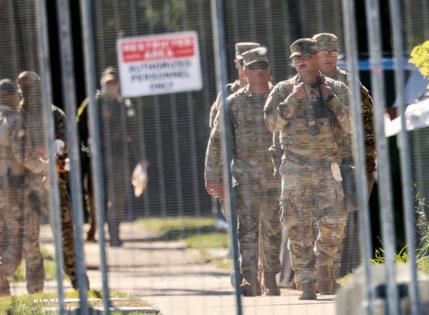Texas National Guard departs Illinois
Published in News & Features
CHICAGO — The Texas National Guard has departed Illinois, ending a futile 41-day deployment in which its soldiers spent less than 24 hours working in support of President Donald Trump’s mass deportation mission.
The troops, who had been living at a U.S. Army Reserve training center in southwest suburban Elwood, left the facility around 1 p.m. Monday, according to a memorandum obtained by the Tribune. Additionally, any military personnel not permanently assigned to the Elwood facility would leave the site by Friday, the memo stated.
In the memo, which was sent to local government officials on Monday, an official with Homeland Operations, 88th Readiness Division in Fort Sheridan, wrote that the “status of forces at the Joliet Local Training Area (JLTA), Elwood” had changed.
As of 1 p.m., “all Soldiers that were utilizing the JLTA for living accommodations have departed the property. All established support requirements with your agencies beyond your normal scope of duties may cease at this time. There will still be a small element providing access control while contracted entities remove their equipment,” the memorandum stated. “Currently there is no definitive timetable for when the contractor will complete this action, however the Task Force Commander has directed that Friday will be the last day for any Military Personnel not permanently assigned to the Elwood Reserve center to be on site.”
The departure marks yet another sign that Operation Midway Blitz — the name given to Trump’s immigration crackdown — is winding down.
Last week, the Chicago Tribune reported Border Patrol Cmdr. Gregory Bovino, the top official on the ground leading the Trump administration’s efforts, was soon departing Chicago for another assignment, and most of the agents under this command were redeploying elsewhere. On Friday, the U.S. Department of Homeland Security closed its command center at Naval Station Great Lakes in North Chicago, ending a more than two-month stay there.
About 200 Texas National Guard members arrived in the Chicago area last month over the repeated objections of Illinois officials, who rejected Trump’s pledge to deploy the military domestically in response to heated protests here. The California National Guard also had troops temporarily assigned to the area.
The Guard members, however, spent only one day protecting a U.S. Immigration and Customs Enforcement detention center in Broadview before a federal judge blocked their deployment. The judge, however, allowed the out-of-state troops to remain at the Elwood training center, where they lived in mobile bunks and could be seen practicing drills during the day.
A week after arriving, the Texas National Guard sent home seven soldiers whose fitness levels seemingly “did not meet mission requirements” for their deployment. The decision came after some soldiers were ridiculed on social media for their physical appearance upon their arrival in Illinois. Widely circulated media photographs showed heavier guardsmen at the Elwood base, prompting critics to question how the troops fit in with U.S. Defense Secretary Pete Hegseth’s insistence that all military members must meet height and weight standards.
The troops’ stay was otherwise uneventful, as underscored by the memorandum sent to local government agencies Monday.
“I would like to thank all of you on behalf of the United States Army Reserve Homeland Operations Division for your support over the last 2 months in helping make the living area safe by providing emergency response functions and services, traffic mitigation, and decontamination coordination,” wrote Joseph Arne, an emergency management specialist with Homeland Operations. “There wasn’t ever a moment where the Task Force was concerned for Soldier safety knowing your organizations were on stand-by.”
It’s unclear how the troop departures will affect the ongoing legal battle between Illinois and the Trump administration, as the issue is now before the U.S. Supreme Court.
While considering a motion to stay a lower court’s order blocking the deployment, the Supreme Court last month asked both sides — the Trump administration and the state of Illinois — to submit supplemental briefs dealing with a provision in federal law that Trump says allows him to dispatch National Guard troops in cases where there is an invasion, a rebellion or a time when the president “is unable with the regular forces to execute the laws of the United States.”
The key issue the high court sought briefings on was whether the term “regular forces” means “the regular forces of the United States military,” and if so, how that fits into existing law involving the president’s power to order up the National Guard.
_____
©2025 Chicago Tribune. Visit chicagotribune.com. Distributed by Tribune Content Agency, LLC.







Comments